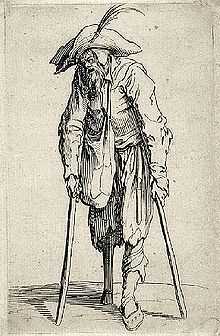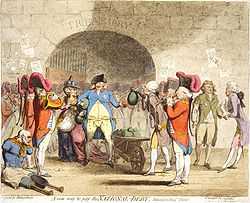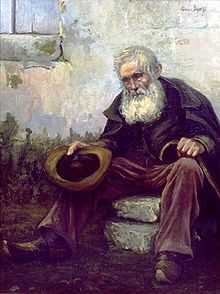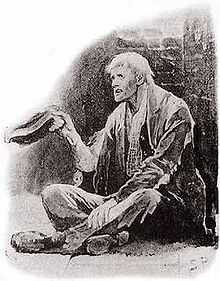Begging
Begging is the practice of imploring others to grant a favor, often a gift of money, with little or no expectation of reciprocation. Beggars may be found in public places such as transport routes, urban parks, and near busy markets. Besides money, they may also ask for cigarettes or other small items.

According to a study in the journal of the Canadian Medical Association, "(70%) [of beggars] stated that they would prefer a minimum-wage job, typically citing a desire for a 'steady income' or 'getting off the street.' However, many felt they could not handle conventional jobs because of mental illness, physical disability or lack of skills."[1]
History

Beggars have existed in human society since before the dawn of recorded history. Begging has happened in most societies around the world, though its prevalence and exact form vary.
Greece
Ancient Greeks distinguished between the ptochos (Greek: πτωχός, "passive poor" or "beggars") and the penes (Greek: ποινής, "active poor"), with the latter being accorded a higher social status.[2] The New Testament contains several references to Jesus' status as the savior of the ptochos, usually translated as "the poor", considered the most wretched portion of society.[3]
Britain

According to Jackson J. Spielvogel, "Poverty was a highly visible problem in the eighteenth century, both in cities and in the countryside... Beggars in Bologna were estimated at 25 percent of the population; in Mainz, figures indicate that 30 percent of the people were beggars or prostitutes... In France and Britain by the end of the century, an estimated 10 percent of the people depended on charity or begging for their food."[4]
The British Poor Laws, dating from the Renaissance, placed various restrictions on begging. At various times, begging was restricted to the disabled. This system developed into the workhouse, a state-operated institution where those unable to obtain other employment were forced to work in often grim conditions in exchange for a small amount of food. The welfare state of the 20th century greatly reduced the number of beggars by directly providing for the basic necessities of the poor from state funds.
Religious begging
Many religions have prescribed begging as the only acceptable means of support for certain classes of adherents, including Christianity, Hinduism, Sufi Islam, Buddhism, and Jainism, typically to provide a way for certain adherents to focus exclusively on spiritual development without the possibility of becoming caught up in worldly affairs.
In Buddhism, monks and nuns traditionally live by begging for alms, as did the historical Gautama Buddha himself. This is, among other reasons, so that lay people can gain religious merit by giving food, medicines, and other essential items to the monks. The monks seldom need to plead for food; in villages and towns throughout modern Thailand, Cambodia, Vietnam, and other Buddhist countries, householders can often be found at dawn every morning streaming down the road to the local temple to give food to the monks. In East Asia, monks and nuns were expected to farm or work for returns to feed themselves up.[5][6][7]
Legal restrictions
Begging has been restricted or prohibited at various times and for various reasons, typically revolving around a desire to preserve public order or to induce people to work rather than to beg for economic or moral reasons. Various European Poor Laws prohibited or regulated begging from the Renaissance to modern times, with varying levels of effectiveness and enforcement.

"Aggressive panhandling" has been specifically prohibited by law in various jurisdictions in the United States and Canada, typically defined as persistent or intimidating begging. [8]
Canada

The province of Ontario introduced its Safe Streets Act in 1999 to restrict specific kinds of begging, particularly certain narrowly-defined cases of "aggressive" or abusive begging.[9] In 2001 this law survived a court challenge under the Canadian Charter of Rights and Freedoms.[10] The law was further upheld by the Court of Appeal for Ontario in January 2007.[11]
One response to the anti-panhandling laws which were passed was the creation of the Ottawa Panhandlers Union which fights for the political rights of panhandlers. The union is a shop of the Industrial Workers of the World.
British Columbia enacted its own Safe Streets Act in 2004 which resembles the Ontario law. There are also critics in that province who oppose such laws.[12]
United States
In parts of San Francisco, California, aggressive panhandling is prohibited.[13]
In May 2010, police in the city of Boston started cracking down on panhandling in the streets in downtown, and were conducting an educational outreach to residents advising them not to give to panhandlers. The Boston police distinguished active solicitation, or aggressive panhandling, versus passive panhandling of which an example is opening doors at store with a cup in hand but saying nothing.[14]
United Kingdom
Begging is illegal under the Vagrancy Act of 1824. However it does not carry a jail sentence and is not well enforced in many cities,[15] although since the Act applies in all public places it is enforced more frequently on public transport.
Finland
Begging has been legal in Finland since 1987 when the Poor Law was invalidated. In 2003, the Public Order Act replaced any local government rules and completely decriminalized begging.[16]

Romania
Law 61 of 1991 forbids the persistent call for the mercy of the public, by a person which is able to work.[17]
US State Department Human Rights reports note a pattern of Roma children registered for "vagrancy and begging".[18]
Japan
Buddhist monks appear in public when begging for alms.[19] Although homelessness in Japan is common, such people rarely beg.
Portugal
In Portugal, panhandlers normally beg in front of Catholic churches, at traffic lights or on special places in Lisbon or Oporto downtowns. Begging is not illegal in Portugal. Many social and religious institutions support homeless people and panhandlers and the Portuguese Social Security normally gives them a survival monetary subsidy.
Luxembourg
Begging in Luxembourg is legal except when it is indulged in as a group or the beggar is a part of an organised effort. According to Chachipe a Roma rights advocacy NGO 1639 begging cases were reported by Luxembourgian law enforcement authorities. Roma beggars were arrested, handcuffed, taken to police stations and held for hours and have their money confiscated.[20]
Use of funds
A 2002 study of 54 panhandlers in Toronto reported that of a median monthly income of $638 Canadian dollars (CAD), those interviewed spent a median of $200 CAD on food and $192 CAD on alcohol, tobacco and illegal drugs, according to Income and spending patterns among panhandlers, by Rohit Bose and Stephen W. Hwang.[21] The Fraser Institute criticized this study citing problems with potential exclusion of lucrative forms of begging and the unreliability of reports from the panhandlers who were polled in the Bose/Hwang study.[22]
In North America, panhandling money is widely reported to support substance abuse and other addictions. For example, outreach workers in downtown Winnipeg, Manitoba, Canada, surveyed that city's panhandling community and determined that approximately three-quarters use donated money to buy tobacco products while two-thirds buy solvents or alcohol.[23] In Midtown Manhattan, one outreach worker anecdotally commented to the New York Times that substance abuse accounts for 90 percent of panhandling funds.[24]
Communities reducing street begging
Because of concerns that people begging on the street may use the money to support alcohol or drug abuse, some advise those wishing to give to beggars to give gift cards or vouchers for food or services, and not cash.[25][26][27][23][28][29] Some shelters also offer business cards with information on the shelter's location and services, which can be given in lieu of cash.[30]

Notable beggars
- Bampfylde Moore Carew, self-styled King of the Beggars
- Diogenes of Sinope
- Gautama Buddha, the founder of Buddhism accepted alms from people to survive[31]
- Gavroche Thenardier in Victor Hugo's Les Misérables
- Lazarus
- Nicholas Jennings in Thomas Harman's Caveat for Common Cursitors
- Shabkar,[32] Tibetan itinerant monk
- So Chan, Chinese folk hero of Drunken Fist
See also
- Aggressive panhandling
- Alms
- Begging behavior in animals
- Begging letter
- Belisarius
- Busking
- Child Begging
- Fundraising
- Internet begging
- Mendicant Orders
- Poor law
References
- ↑ "Income and spending patterns among panhandlers". CMAJ 167 (5): 477–9. September 2002. PMC 121964. PMID 12240813.
- ↑ Cavallo, Guglielmo (1997). The Byzantines. Chicago, Illinois: University of Chicago Press. ISBN 0-226-09792-7.
- ↑ http://www.biblestudytools.com/lexicons/greek/nas/ptochos.html
- ↑ Jackson J. Spielvogel (2008). "Western Civilization: Since 1500". Cengage Learning. p.566. ISBN 0-495-50287-1
- ↑ "農禪vs商禪" (in (Chinese)). Blog.udn.com. 2009-08-19. Retrieved 2011-12-05.
- ↑ "僧俗". 2007.tibetmagazine.net. Retrieved 2011-12-05.
- ↑ "鐵鞋踏破心無礙 濁汗成泥意志堅——記山東博山正覺寺仁達法師". Hkbuddhist.org. Retrieved 2011-12-05.
- ↑ Johnny Johnson (November 3, 2008). In tough times, panhandling may increase in Oklahoma City. The Oklahoman
- ↑ "Safe Streets Act". Government of Ontario. 1999. Archived from the original on 2006-09-02. Retrieved 2006-09-29.
- ↑ "'Squeegee kids' law upheld in Ontario". CBC News. 2001-08-03. Retrieved 2006-09-29.
- ↑ "Squeegee panhandling washed out by Ontario Appeal Court". CBC News. 2007-01-17. Retrieved 2007-03-19.
- ↑ "Police chief welcomes Safe Streets Act". CBC News. 2004-10-26. Archived from the original on 2007-05-10. Retrieved 2006-09-29.
- ↑ Debate Continues Over Proposed Sit-Lie Ordinance, KTVU, 10 March 2010
- ↑ Schuler, Melina, "Cops Planning to Combat Panhandling", The Boston Courant, May 14–20 issue, 2010. "Aggressive solicitation is against the law and is defined as an action that is likely to cause a reasonable person to fear harm or to intimidate him or her into compliance, Ivens said. Passive panhandling, like in front of a convenience store, is constitutionally allowed, however, it is a violation of a Boston ordinance to do it within 10 feet [3 m] of an ATM, bank, or check cashing business during hours of operation, [Boston Police Captain Paul] Ivens said."
- ↑ Bunyan, Nigel (2003-08-22). "Beggar ban may spark nationwide crackdown". The Daily Telegraph. London. Retrieved 2010-04-26
- ↑ Authorities powerless to act against beggars with children in tow. Helsingin Sanomat
- ↑ "Legea nr. 61/1991 (republicata 2011)" (in Romanian). Poliția de Proximitate. Retrieved 2011-12-01.
- ↑ Bureau of Democracy, Human Rights, and Labor (2006-03-08). "Country Reports on Human Rights Practices - 2005 (Romania)". U.S. Department of State. Archived from the original on 29 September 2006. Retrieved 2006-09-29.
- ↑ "The Zen - Teaching of Mu". Japan National Tourist Organisation. Retrieved 2008-07-27.
- ↑ Groth, Annette (2012-06-01). "The situation of Roma in Europe: movement and migration". Council of Europe: Committee on Migration, Refugees and Displaced Persons. Retrieved 14 April 2013.
- ↑ Bose, Rohit and Hwang, Stephen W. (2002-09-03). "Income and spending patterns among panhandlers". Canadian Medical Association Journal. pp. 167(5) 477–479. Retrieved 2006-09-29.
- ↑ "Begging for Data". Canstats. 3 September 2002. Retrieved 2006-09-29.
- ↑ 23.0 23.1 ""Change for the Better" fact sheet" (PDF). Downtown Winnipeg Biz. Archived from the original on 2006-08-13. Retrieved 2006-09-29.
- ↑ Tierney, John (1999-12-04). "The Big City; The Handout That's No Help To the Needy". The New York Times. p. B1. Retrieved 2006-09-29.
- ↑ "Evaluation study of the Oxford Begging Initiative". Oxford City Council. Retrieved 2013-10-25.
- ↑ Johnsen & Fitzpatrick, S. & S. (2010). "Revanchist Sanitisation or Coercive Care? The Use of Enforcement to Combat Begging, Street Drinking and Rough Sleeping in England". Urban Studies 47 (8): 1703–1723. Retrieved November 25, 2013.
- ↑ Hermer, J. (1999). Policing compassion: ‘Diverted Giving’ on the Winchester High Street. Bristol: The Policy Press. ISBN 1861341555. Retrieved 2013-10-25.
- ↑ "Real Change, not Spare Change". Portland Business Alliance. Archived from the original on 13 November 2006. Retrieved 2006-09-30.
- ↑ Dromi, Shai M. (12 2012). "Penny for your Thoughts: Beggars and the Exercise of Morality in Daily Life". Sociological Forum 27 (4): 847–871. doi:10.1111/j.1573-7861.2012.01359.x. Retrieved November 18, 2012.
- ↑ Peace Studies Program. "Homelessness Contact Cards". George Washington University. Archived from the original on 9 September 2006. Retrieved 2006-09-30.
- ↑ "Begging Bowl - Buddhist Things". ReligionFacts. Retrieved 2011-12-05.
- ↑ "Shabkar Tsokdruk Rangdrol". Rigpa Wiki. 2009-10-06. Retrieved 2011-12-05.
Further reading
- Karash, Robert L., "Spare Change?", Spare Change News, March 25, 2010.
- Malanga, Steven, The Professional Panhandling Plague, City Journal, v.18, n.3, Summer 2008, The Manhattan Institute, New York, NY.
- Sandage, Scott A., Born Losers: A History of Failure in America, Harvard University Press, 2005
External links
| Wikimedia Commons has media related to Begging. |
| Look up begging, spanging, panhandling, or mendicancy in Wiktionary, the free dictionary. |
| Wikivoyage has a travel guide for Begging. |
| Wikisource has the text of the 1911 Encyclopædia Britannica article mendicancy. |
- Rooney, Emily, "Panhandling — Public Nuisance Or Basic Right?", The Emily Rooney Show, WGBH-FM Radio, Boston, Tuesday, June 5, 2012. Guests: Vincent Flanagan, Executive Director of Homeless Empowerment Project Spare Change News; Robert Haas, Cambridge Police Commissioner; Denise Jillson, President of the Harvard Square Business Association
